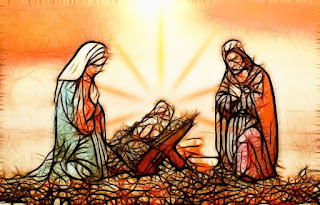Wow, Christmas already? It feels like a year...okay, it happens that way. This post is a follow-up of sorts to "Christmas is More than People Think", and it would be helpful to read the article linked there before reading this one. Helpful, but not essential.
Most professing Christians and some people who give a nod to it celebrate Christmas. Ask them what it means, you will be told that the Son of God was born. There is far more involved than that simple answer provides.
 |
| Pixabay / Gerd Altmann |
Biblical creationists spend time not just in science, but in theology as well. Many emphasize that God the Son is the Creator (John 1:1-3, Col. 1:16, Heb. 1:2-3), and that helps impress on us the Incarnation. He humbled himself, was born as Jesus, was crucified on a cross, and raised bodily from the dead the third day. Scripture shows many places where all these things were prophesied, and how deeper understanding shows how important they are throughout.
Jesus’ existence didn’t begin with His birth or conception, but pre-existed Creation, as made by Him and for Him. Jesus was both with God and God Himself. That such a divine Person exists is taught throughout Scripture, starting in Genesis. The plurality within the Godhead makes it possible for God to be intrinsically a ‘God of Love’.
In Jesus, God took on human nature, so He could die for our sins as a fellow human, taking the penalty we deserve for our sins. In fact, this was planned from Eternity, as the names of the Redeemed were already written in His Book of Life from the foundation of the World.
When Jesus took on humanity, this was an addition to His divine nature, not a subtraction of His divinity. Thus everything He taught, He taught with authority—including about Creation and the Flood.
I hope you'll read the rest and it is a blessing to you this Christmas. To do so, journey to "The Incarnation: Why did God become Man?"

Comments
Post a Comment
Comments are moderated and become my property. Do not forget, you can have your own discussions on the topics at hand by using the social media sharing buttons beneath each post.